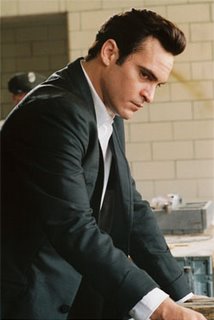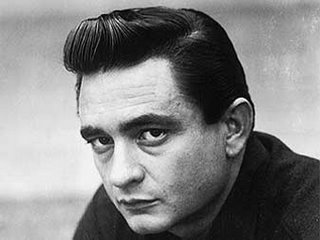
When Joaquin Phoenix as Johnny Cash in Walk the Line fingers the teeth of that table saw at the start of the movie, the convicts' feet thumping like the T. Rex in Jurassic Park--both making the water's surface jump--I was immediately relieved: I knew I wasn't going to have to slog dutifully through every inspiring step in a calcified Great One's life and career, milestones bright and obvious, ticked off in obligation to its subject. That is the grave danger of the biopic, and I won't make comparisons--although I do need to mention that Ray is mostly compelling for Jamie Foxx's performance, rather than the movie's structure and rhythms; while Great Balls of Fire, Jim McBride's 1989 take on Jerry Lee Lewis, wisely chooses to spin out like the Killer himself, glorious and goofy; its rhythm is "the beat, the beat, the beat." Walk the Line follows McBride's lead, except it respects its subject more--while not sanctifying it. Phoenix's Cash is introspective and haunted--which can be a trap as well, the Deep Pop Star approach that makes my skin crawl.
 Mangold and company, however, manage to avoid the extremes of both Saint John and the Man in Black. Instead, we are given a fundamental problem--How does one recover from a deep and early loss?--and asked to watch that recovery stumble up the hill. The saw-blade that killed Cash's brother resonates like those stomping feet, and Phoenix carries the sound in his eyes; we can also see it in the trademark scar--the internet tells me he was born with it; another metaphor--that forces even his sunniest or saddest moods into a bit of a sneer; and best of all we hear it in his voice. Phoenix (and co-star Witherspoon) give the movie a great gift by doing their own singing--and not to display their abilities as mimics, but to capture the emotional depth of the need for restoration. Phoenix has staked his claim on that need--I don't like to indulge in biographical criticism, but I cannot help thinking of River, dead at the hands of the same kinds of demons that snapped at Cash's heels--and Joaquin's: again, the internet tells me he is a recovering alcoholic. I often think bringing up such details is rudely intrusive, ultimately distracting, but in Walk the Line they do accumulate in the biographies of the characters and the actors, commingling to provide layers of sediment--or is it steps on Jacob's Ladder?--that enrich, not cheapen, the film, and allow Cash to ascend intact. Among his final recordings is My Mother's Hymn Book. And the last song on that album is "Just As I Am": "I come I come ... waiting not to rid my soul of one dark blot." And as long as we're on Last Things, the last song on the last volume of American Recordings is "We'll Meet Again." It is a beautifully silly thing, since it is also the song that wraps up Dr. Strangelove. Johnny serenades the Apocalypse, and manages a quick one-sided grin.
Mangold and company, however, manage to avoid the extremes of both Saint John and the Man in Black. Instead, we are given a fundamental problem--How does one recover from a deep and early loss?--and asked to watch that recovery stumble up the hill. The saw-blade that killed Cash's brother resonates like those stomping feet, and Phoenix carries the sound in his eyes; we can also see it in the trademark scar--the internet tells me he was born with it; another metaphor--that forces even his sunniest or saddest moods into a bit of a sneer; and best of all we hear it in his voice. Phoenix (and co-star Witherspoon) give the movie a great gift by doing their own singing--and not to display their abilities as mimics, but to capture the emotional depth of the need for restoration. Phoenix has staked his claim on that need--I don't like to indulge in biographical criticism, but I cannot help thinking of River, dead at the hands of the same kinds of demons that snapped at Cash's heels--and Joaquin's: again, the internet tells me he is a recovering alcoholic. I often think bringing up such details is rudely intrusive, ultimately distracting, but in Walk the Line they do accumulate in the biographies of the characters and the actors, commingling to provide layers of sediment--or is it steps on Jacob's Ladder?--that enrich, not cheapen, the film, and allow Cash to ascend intact. Among his final recordings is My Mother's Hymn Book. And the last song on that album is "Just As I Am": "I come I come ... waiting not to rid my soul of one dark blot." And as long as we're on Last Things, the last song on the last volume of American Recordings is "We'll Meet Again." It is a beautifully silly thing, since it is also the song that wraps up Dr. Strangelove. Johnny serenades the Apocalypse, and manages a quick one-sided grin.
No comments:
Post a Comment